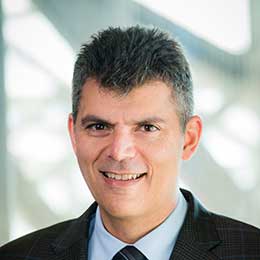What to Expect as an Editor in Chief
In 2023, two new publications will join the journal CHEST® portfolio: CHEST Critical Care and CHEST Pulmonary.
These new titles come at an unprecedented time for the journal CHEST, when a surge of COVID-related research and drastically increasing clinical workloads among many authors led the journal to innovate. This included fast-tracking more articles, creating more complementary research summaries, and making more content freely available than ever before.
CHEST Critical Care and CHEST Pulmonary will continue this evolution, offering a new home for unique clinical content of importance to our readers and more avenues for researchers to publish their work.
With the journal expansion also comes new opportunities for professional growth. CHEST is seeking two Editors in Chief to launch and lead CHEST Critical Care and CHEST Pulmonary in coordination with Peter Mazzone, MD, MPH, FCCP, Editor in Chief of the journal CHEST.
We spoke with Dr. Mazzone about his experiences leading the journal CHEST and what applicants can expect from the role of Editor in Chief of a new open access journal.
Refining your skills—and building new ones
 Peter Mazzone, MD, MPH, FCCP
Peter Mazzone, MD, MPH, FCCP
For Dr. Mazzone, becoming Editor in Chief of the journal CHEST offered an opportunity to enhance his education on the essential elements of research—and build his skills in other important areas.
“In taking this position, I wanted to be sure I was as knowledgeable as possible, both in study design and in how you review and analyze studies, early on. It was a reeducation in what I may have learned about research previously,” he said.
Serving as Editor in Chief also created new opportunities for Dr. Mazzone to enhance his leadership style and recruit his own team of highly skilled clinician colleagues to help him fulfill his vision for the publication.
“I had built some clinical programs, but building a journal program like this was very new to me,” he said. “The other part was learning how to manage a big, diverse team. It helped me develop my own leadership style and approach. I work with lots of busy people, lots of people who are very accomplished; I’ve had to learn how to lead that group in a way that keeps them engaged and excited about what they’re doing.”
Growing your portfolio, your network, and your clinical impact
“Serving as Editor in Chief has helped my career in lots of ways. One, to have this as part of my work portfolio has given me the opportunity to do interesting clinical and research projects,” he said. “It’s kept me fresh and kept me thinking. And it has enabled me to meet a lot of amazing people—leaders in their field—and to invite them to contribute to the journal.”
But for Dr. Mazzone, the impact of the role doesn’t end at a thriving network and a more robust CV; serving as Editor in Chief also offers the incredible opportunity to influence care for patients across the globe.
“We’re used to helping individual patients and getting a lot of satisfaction from that, and serving as Editor in Chief seemed like a chance to help them on another level by putting this program and these projects together and helping the journal reach even more clinicians,” he said. “It’s quite humbling how much impact the position can have. For example, there were 7.9 million downloads of articles in [the journal] CHEST last year, and we had submissions from over 70 different countries. The role is very personally satisfying, but then you hear that part of what you’re doing has this scope of impact, and it is quite humbling.”
Taking your chance to lead
When asked what he’d tell anyone looking to take the next step in their career journey by becoming an editor in chief, Dr. Mazzone had one important piece of advice: Take your chance while you can.
“I think if it’s really an interest of theirs, if they’re at a point where they’d like a challenge that can be really gratifying, I encourage them to bring their name in and be as thoughtful as possible about what they may want to bring to the table in their application,” he said. “But don’t hesitate— it’s a great experience, and it doesn’t come around too often. If you have that interest, give it a try.”
Learn more about the roles, and start your application.